UWE Bristol experts win funding for project looking at inequalities faced by black people living with after-effects of stroke

Researchers from UWE Bristol will be looking at how health inequalities faced by black people in the UK living with the after-effects of a stroke can be addressed.
The 12-month project, funded by the National Institute for Health and Social Care Research (NIHR), is due to start in October. It will see UWE Bristol researchers team up with academics from Kingston University.
The project, entitled Inclusivity in Stroke Self-Management Support (ISSMAS), will develop resources to help black people who have experienced a stroke manage their condition. It also aims to inform healthcare professionals about how they can best support, and communicate with, Black African and Caribbean stroke survivors as they navigate their rehabilitation journey.
Working on the project from UWE Bristol will be Dr Jo White and Dr Emily Dodd (Centre for Public Health and Wellbeing) along with Dr Mary Cramp (Centre for Health and Clinical Research).
Dr White, Project Co-Lead, said: “The UWE team has been collaborating with community members from Bristol living with stroke for a number of years. They have been instrumental in getting this project off the ground. We aim to deepen understanding of the experiences of black people who have experienced stroke and come up with resources and approaches which ensure they receive the advice and support they need. Projects such as this which promote community voices and experiences are crucial to reducing health inequalities and we are delighted to receive NIHR funding.”
Stroke is a leading cause of adult disability and death in the UK, with black people twice as likely to have a stroke, more likely to experience stroke younger, and at higher risk of multiple strokes. Those living with sickle cell disease are particularly vulnerable.
The project builds on previous research that revealed how black people often struggled to find resources to help them when they returned home from hospital following a stroke. It also found many healthcare professionals lacked cultural awareness and understanding, furthering health inequalities. The project will follow a co-design approach which will see black people living with the after-effects of stroke working closely with representatives of community organisations and health and social care professionals in advising the production of new resources.
Professor Tushna Vandrevala, of Kingston University, project Co-Lead, said: “Our ultimate aim is to come up with solutions that make sure black people living in the community following a stroke are supported and their needs are met. Even more importantly it is vital that we can make recommendations for an inclusive and culturally relevant approach – inclusivity is absolutely key.”
Recruitment is now under way for two research fellows – one from UWE Bristol and one from Kingston University – who will support the project. Candidates will ideally have a PhD in health service research or a social science background, either be from the black community or have experience working with ethnically diverse communities, and have experience of doing qualitative research. For further information about the UWE Bristol post please contact Jo.White@uwe.ac.uk.
Related news

12 December 2025
UWE Bristol’s environmentally conscious and student-focused accommodation wins three awards
Purdown View, the world's largest certified Passivhaus student accommodation development, has been recognised at Property Week Student Accommodation Awards.

13 November 2025
Alliance Medical and UWE Bristol launch UK’s first PET-CT postgraduate certificate
In a move set to transform imaging education, Alliance Medical (AML) and UWE Bristol have joined forces to co-design and develop the UK’s first PET-CT Postgraduate Certificate (PG Cert).

10 November 2025
Lessons from Low Traffic Neighbourhoods will drive better public engagement, study finds
Lessons from Low Traffic Neighbourhoods have informed a new toolkit to improve engagement with the public on challenging local street issues.
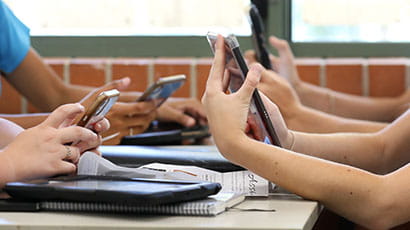
29 September 2025
Smartphone use hitting struggling pupils hardest, major study finds
Young people struggling with their studies at school are much more likely to have negative experiences on their smartphones than their better performing peers, a major new study has found.

11 September 2025
New study to investigate augmented reality as an intervention for emotionally based school avoidance
A UWE Bristol researcher will support a new study exploring whether an augmented reality board game can help young people with emotionally based school avoidance (EBSA).
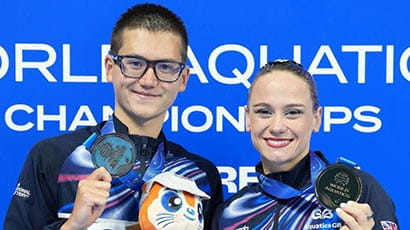
28 July 2025
Student wins bronze medal at World Aquatics Championships on her graduation day
UWE Bristol sports rehabilitation student Izzy Thorpe made waves at the World Aquatics Championships winning a bronze medal in artistic swimming on the same day she was meant to be crossing the stage at her university graduation ceremony.
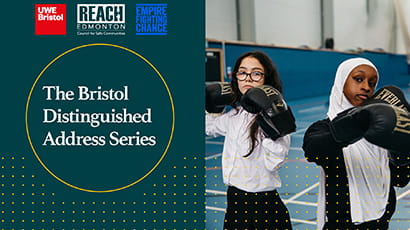
28 May 2025
Leading organisations fighting to end youth violence in cities join UWE Bristol event panel
Leaders from Bristol-based Empire Fighting Chance and Canadian non-profit REACH will speak at the next Bristol Distinguished Address Series.
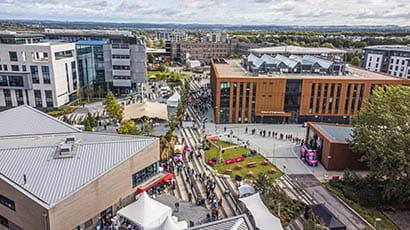
09 May 2025
UWE Bristol among first universities in UK to introduce sanitary waste bins in male toilets
UWE Bristol is among the first universities in the UK to introduce sanitary waste bins in male toilets for the disposal of incontinence products.
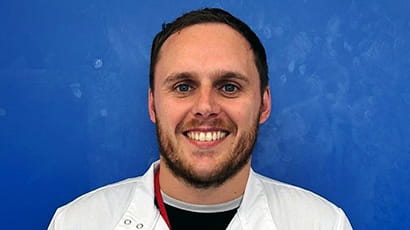
11 April 2025
UWE Bristol academics among emerging scientific leaders to receive share of £7.6m for health research
Two UWE Bristol researchers are among the recipients of a £7.6 million investment from the Academy of Medical Sciences aimed at tackling urgent health challenges.
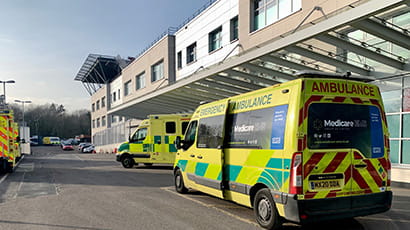
09 April 2025
New research to support a thriving health and care workforce is launched
A national research partnership will explore ways to support wellbeing and sustainability in the NHS and social care same day and urgent care workforce.

10 March 2025
UWE Bristol to explore the power of open water swimming at upcoming event with The Wave founder Nick Hounsfield
An inspiring tale of grit and resilience will be told to audiences at the first BDAS event of 2025 as UWE Bristol welcomes Nick Hounsfield, founder of The Wave.

28 February 2025
Paramedics in GP surgeries may ease workload but not NHS costs, study finds
Paramedics working in GP surgeries help reduce GP workload but do not contribute to cost savings to the NHS, according to the first major study of the clinical and cost-effectiveness of paramedic compared with GP consultations.
You may also be interested in

Media enquiries
Enquiries related to news releases and press and contacts for the media team.
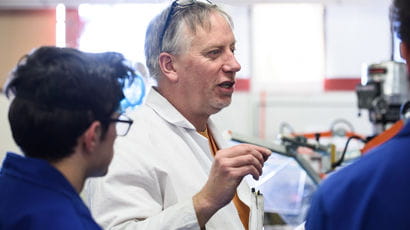
Find an expert
Media contacts are invited to check out the vast range of subjects where UWE Bristol can offer up expert commentary.

Centre for Public Health and Wellbeing (CPHWB)
The Centre for Public Health and Wellbeing enables ethical and reflexive contributions to public health policy and practice.






